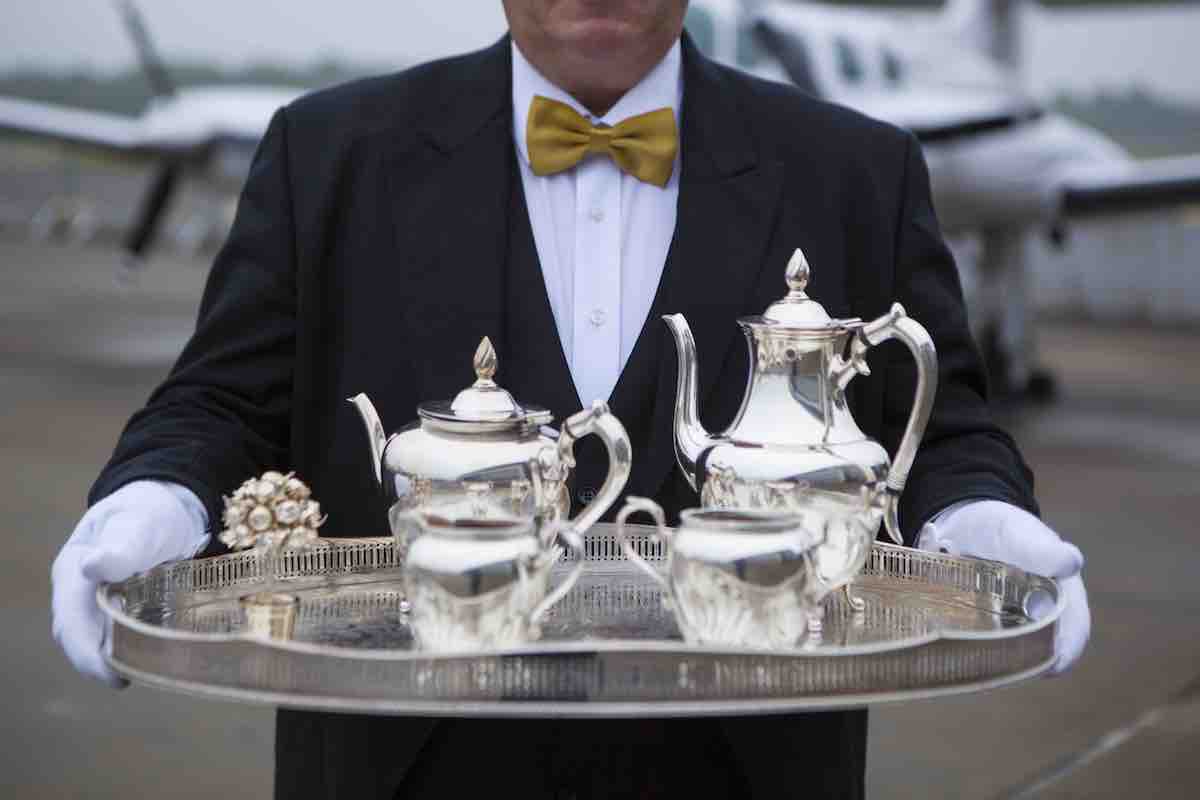This website uses cookies so that we can provide you with the best user experience possible. Cookie information is stored in your browser and performs functions such as recognising you when you return to our website and helping our team to understand which sections of the website you find most interesting and useful.
In-house insight: a look at the modern butler with Polo & Tweed CEO and founder Lucy Challenger
By Gabriel Power | 19 January 2021 | Culture
As hit Netflix series Bridgerton takes the country by storm, Tempus learns how butlering has changed since the Regency

To understand the way in which the general public sees butlers, and British butlers in particular, one need look no further than the hit Netflix show Bridgerton. This whimsical period comedy, set amongst the extraordinary pomp of Regency London, features myriad references to – and scenes of – butlering in its rather archaic form, as we watch the Duke of Hasting’s servant Jeffries (Jason Barnett) undertake a raft of household duties with an air of impossibly composed grace that many likely believe to be a relic of a bygone era.
As the modern world becomes an arena of ever-increasing automation and cutting-edge technology, hiring a designated head of the house to tackle the tasks of dealing with deliveries or managing staff might seem unthinkable or unnecessary. But in a conversation with Polo & Tweed founder Lucy Challenger this week, Tempus discovered that the modern butler is so much more than a human diary or server – they are an essential part of daily life in the land of the elites, and are part of an industry that has not merely survived into the 21st century, but thrived.

“The idea of the modern butler has obviously evolved from the days of the Regency,” Challenger says. “For example, a modern butler might be dressed in chinos and a polo shirt while serving Jack Daniel’s and Coke on a tray for lunch in front of the TV, rather than organising a banquet every single day.
“But some things have not changed, such as the need for multitasking and an ability to get on with other staff members while also ‘managing up’ and working as a go-between for the workers and the principal” she says, noting that word “principal” has usurped the word “boss” or “master” in modern butlering parlance.
Challenger, having started a number of successful businesses before founding Polo & Tweed in 2015, has a keen eye for what makes a butler great, but in her description of the ideal server she refuses to be hemmed in by prescriptive task management. As such, rather than suggesting that the perfect butler would prepare a suit in a certain manner or organise staff in a particular way, her choice of words hints at a deep trust that her butlers will always make the correct decisions based on the situation at hand.
“The ideal butler should have discretion, flexibility and an eye for finishing touches,” she says. “They should have an ability to notice things before they need noticing and do things before they need to be done.”
“For instance, if your principal is flying into town and you know that he or she likes a certain restaurant that has a four-month waiting list, as a great butler you might check every week for availability,” she adds. “It’s about going that extra mile to create an experience for your principal that he or she wouldn’t be able to manage without your help.”
A recurring theme one might notice when considering the hire of a butler is a consistent demand for “British butlers”, who are the considered the best of the best across the globe. This subset of servers is coveted by principals from Russia, to the Middle East, to the coast of California. But rather than an awkwardly jingoistic sentiment, Challenger notes that this is actually a reference to the UK’s standard of server training, and insists that anyone can be a “British butler” should they receive the correct schooling.

“British butlers and British staff are seen to be the best in the world because we have this backbone of history from the Victorian period – and earlier – in which butlers played a key role,” she says. “And by British we mean trained in Britain – they do not have to have been born here. We have some incredible eastern and western European butlers who have undergone training in the UK and thus fall into the category of British butlers.”
So what about the training is special? Challenger gives an example: “Let’s say you have clients and families coming to Britain from Russia, the Middle East or China. Having a British butler run their household offers them a streamlined approach into high society.
“That butler will know where they should be shopping, which cigars they should be smoking and where they should be getting their suits made,” she adds. “It gives them a link to high London culture that they may not have already and can give them valuable lessons on etiquette.”
And for those further afield, the allure of a British-trained butler is based not only on skill, but also the prestige that comes with it. “If a British butler is exported to an American, Russian, Chinese or Middle Eastern household, those principals can say to their friends and peers that, quite simply, they have one of the best possible members of staff running their household.”
Challenger is also keen to dispel certain negative associations attached to butlering by using historical context. In an ever-increasingly class-conscious world, she admits that that terms such as “servitude”, “servant” or “staff” are often seen as “dirty words”, but points to the Victorian era of butlering by means of a rebuttal.
“We know that from the Victorian period onwards, people would be lifted out of poverty by going into service,” she says. “During this period we had very clearly defined upper, middle and working classes, and the working class who were very poor would be able to get out of the gutter by working for these households.”
“And so, to be in service was seen actually a very privileged position,” she adds. “Obviously we see it very differently now, but back then it was a way of putting food on the table for your family; it was literally a matter of life and death.”

As for the present day, with a pandemic touching all aspects of modern life and multiple industries reeling from the effects of the crisis, things seem to be ticking over just fine at Polo & Tweed.
“We are continuing to recruit and, well, we are very busy,” she admits. “People always need help, and interestingly, families that might not have needed help around the house are now entering the market.
“Middle class families, for instance, have suddenly been faced with the reality that their children are no longer at school, and looking after them can be nigh on impossible if both parents are working full time.”
“Families are reaching out and saying ‘I just need a temporary nanny’ or ‘I just need a temporary chef’ to help them get through this crisis, so we feel like we are giving families the support they need, whether that is through their children’s education or helping out around the house, and are also helping prospective butlers find jobs.”
Find out more about Polo & Tweed’s specialist domestic recruitment services at Poloandtweed.com







